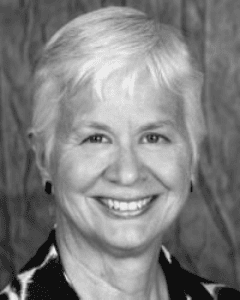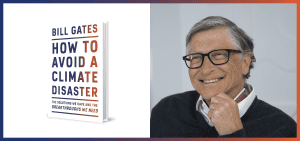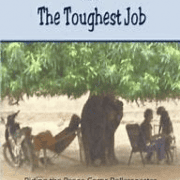Book Review: How to Avoid a Climate Disaster
Last May, resident Sally Densmore also submitted a review about “How to Avoid a Climate Disaster,” which she encouraged others to read. We feel that the following review neither negates nor duplicates Sally’s, which was written on a more personal basis. Taken together, they supplement — or we should probably say, complement — each other in focusing attention on a critically important topic. Indeed, others have been appreciating the book as well as the other books referenced at the end of this article, and we hope that multiple reviews in the Complement will inspire yet more people to engage with the issues.

Leslie Schettler
Reviewed by Leslie Schettler and Anne Newins.

Anne Newins
Legendary Speaker of the House Tip O’Neill was famous for saying “all politics is local.” Bill Gates, one of the world’s wealthiest men and mega-philanthropist, understands that in the case of addressing climate change, all politics must necessarily be global, along with corporate innovation and investment, research and development.
How to Avoid a Climate Disaster by Bill Gates (Alfred Knopf 1921) is an optimistic book, but Gates acknowledges that the necessary steps will be complicated, hard and expensive. This short volume is intended for the readers who may not have a strong science background.
Gates says there are two numbers one needs to know about climate change. One is 51 billion and the other is zero. 51 billion is the number of tons of greenhouse gases the world typically adds to the atmosphere every year. Zero is what we need to aim for, in order to stop the warming and avoid the worst effects of climate change.
There are five “takeaways”:
- We have five sources of carbon emissions, all of which need to drop to zero:
making things; growing things; getting places; plugging in; keeping warm and cool. - Progress is a good thing, but it means increasing greenhouse gases. Many developing countries are just now experiencing the industrial growth that is already a part of the rich world. Gates wants to find ways to continue to improve their prosperity, while still addressing carbon emissions.
- We need to drive down the “green premiums” in every sector, i.e., the difference in cost between choosing the existing option and upgrading to an emissions free (or emissions-reduced) option, such as an electric car. Gates provides a number green premium estimates, such as switching to biofuels for aircraft. In some cases, the premiums are high, in other cases less so. He is optimistic that some premiums may reduce over time as innovations are improved and more widely incorporated.
- The technology we need has yet to be invented; in this area Gates argues for nuclear power as the most efficient energy source because it supplies clean, reliable energy 24/7. He also discusses wind and solar energy, direct air capture and point capture (trapping pollution where it starts).
- We need to adapt to and prepare for existing warming while planning for zero.
Gates follows these discussions with a chapter on the importance of government policies, a plan for getting to zero, and a summary of what each of us can do.
At the end he shares a quote from Hans Rosling, author of Factfulness (also available in the RVM library), “When we have a fact-based worldview, we can see that the world is not as bad as it seems—and we can see what we have to do to keep making it better.”
Reviews of the book have been generally positive. In a New York Times review, Bill McKibben, author of the highly regarded Falter, credits Gates with addressing the issue and his numerous philanthropic investments. At other times, McKibben is more critical.
Gordon Brown, in a review in The Guardian says that “Gates’s most important proposals involve new technologies,” and that he “is right about the scale and urgency of the problem.”
Besides Gates’ and McKibben’s books, several other related books might interest residents and also are available in the Manor library. The Gates book is also available in large print. Other books include Drawdown by Paul Hawken, and Merchants of Doubt by Naomi Oreskes and Erik M. Conway. Beloved naturalist David Attenborough has recently published A Life on Our Planet, and a copy will be made available in the library by late July.










Leave a Reply
Want to join the discussion?Feel free to contribute!